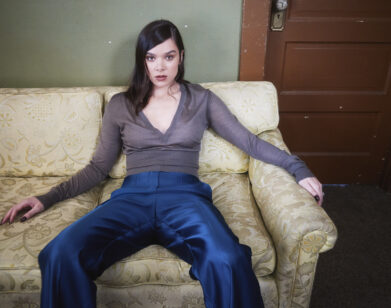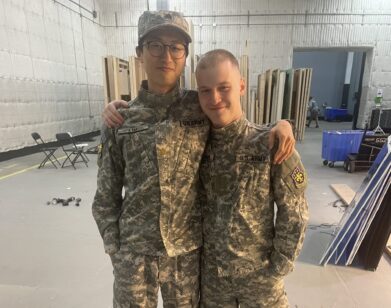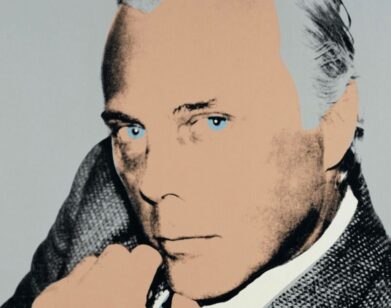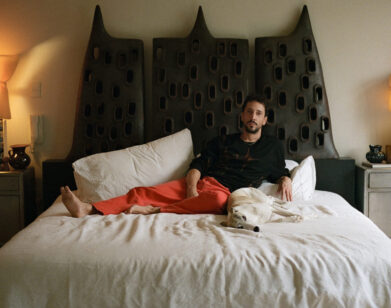Kevin Rahm Takes a Meeting
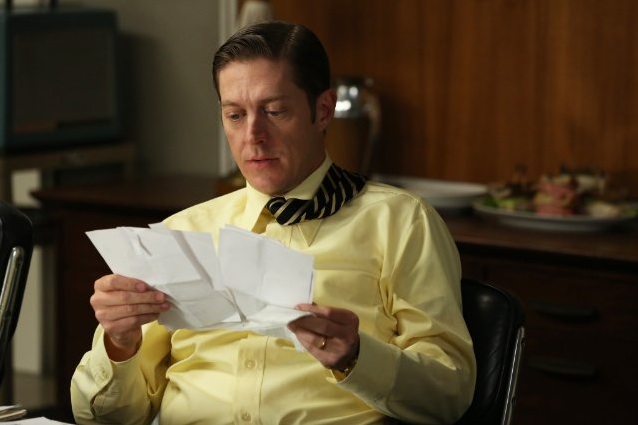
ABOVE: KEVIN RAHM AS TED CHAOUGH ON MAD MEN. IMAGE COURTESY OF MICHAEL YARISH/AMC
Of all the shake-ups and surprises that Matthew Weiner and the writing staff of Mad Men had in store for the staff of Sterling Cooper Draper Pryce throughout the show’s sixth season, the most shocking had to have been what happened early last month, in episode six. Like most decisions in the Mad Men universe, it was a development arrived at after a couple of drinks: in order to win the Chevrolet account that’s out of reach for either of them alone, Don Draper and his former rival, Ted Chaough (who also happens to be the current boss of Draper’s former protégée, Peggy Olson), decide to join forces.
With the merger comes a whole host of new challenges for SCDP—and its new associates from Cutler, Gleason, and Chaough. And for perhaps the first time in six years, the show has presented a formidable opponent for Draper: Chaough, whose energetic, up-and-up approach to business often runs directly counter to Draper’s loose ethics. Actor Kevin Rahm brings a sympathetic, nuanced grace to the character, who, beyond challenging Don’s authority, also contends with his nascent feelings for Peggy. We caught up with Rahm this week, in advance of this Sunday’s season finale.
ALEXANDRIA SYMONDS: You were in, I think, six episodes before this season—is that right?
KEVIN RAHM: Yes.
SYMONDS: And then you became a regular. I’m curious how much you feel like that experience—joining this established enterprise after it had already begun—has mirrored Ted’s fictional one on the show.
RAHM: It’s very similar. On that show, every time you walk into that environment, it’s daunting.
SYMONDS: I’m sure.
RAHM: So, I was lucky enough to have the six episodes to smooth my way in, it made it a little easier having become a regular this year, instead of just jumping right in off the bat in the beginning of the seasons. I’m trying to think how it’s similar… [pauses] I think it is! [both laugh] Did that help you? No, it is. You know, people wonder where he’s coming from and what he’s doing, and I think the same is true on any set. You have an established cast and people know each other and get along really well. You have a new element, and that has to find its way.
SYMONDS: At what point did you learn that you were being promoted to a series regular? How did you react to that?
RAHM: At the end of last season, Matt said that he had big plans for the character, but I was under contract for another show, so it was just kind of up in the air. And it wasn’t until after we wrapped last season, over the summer, that show went away, and they made a call. And I did a little dance.
SYMONDS: [laughs]
RAHM: I was very excited.
SYMONDS: I feel like there’s an alternate universe in which CGC is the agency we’ve been following all this time. We’ve gotten to know the characters of SCDP so well at this point. How much of that history work did you do, for your own benefit?
RAHM: They’re so specific on that show. All the information we have comes from Matt. Any other show, you make your character’s backstory and all that stuff. On this show, you have to be very careful with that, because it can lead you down bad paths. All the information we have has come from the scripts.
SYMONDS: Did you talk to Matt at all about what may be some of the fundamental differences between these two places?
RAHM: We mainly talked about the main differences between Ted and Don and how they interact with their underlings. He made it very clear that Ted wanted to get the best idea from whomever it came from. And so, the best idea wins in Ted’s mind.
SYMONDS: At least at first. [laughs]. There’s maybe some indication this week that that ceased to be the most important factor.
RAHM: Right. He had gotten his way a little bit… his infatuation with Peggy and her talent has gotten in the way a little bit as far as Ginsberg’s point of view. But yeah, that was the main difference. Ted’s point of view is if it benefits the company, it benefits all. I think that’s been a frustrating thing for him. Once the merger happened, his point of view was, “Okay, now we’re a team, now we work together.” It seems to be a lot of infighting that gets in the way of the overall, which is confusing to him.
SYMONDS: Can you talk a little bit about the Don-Ted rivalry and acting with Jon Hamm? I can imagine that’s probably just as intimidating for you as for Ted.
RAHM: Yeah, it’s so interesting. My first scene ever that I shot on the show was with Jon. It was the Benihana scene two seasons ago.
SYMONDS: Oh, right!
RAHM: It’s the first time we meet the character, it’s the first time I’m on the show, it’s the first time I’m doing a scene with Jon. To Jon’s credit, he’s such a good guy and such a great scene partner that he makes it as easy as possible. That being said, you still have to stare down Don Draper once the scene starts. He doesn’t help you in the actual scene; he’s going to be Don Draper. But as a person, off-camera, he makes it as easy as can be. But I’m not going to lie, that was daunting to step up and face Don Draper. And as we got deeper in the season—especially since episode six, the merger, for me at least—the more I had him, the more daunting it became. To have him get the best of me now twice. Once in the drinking and then now pulling the rug out from under me with the client in this last episode. It’s tough. But the opposite side of that—to be able to stand firm and call him out—has been exciting. And again, to Jon’s credit, he’s willing to take the hit in the scene.
SYMONDS: I wondered whether there was a little visual hint this week that Ted is having a bigger effect on Don than he realizes—Don wore a turtleneck!
RAHM: Right? When I saw that, I went to Janie, the costumer, and I was like, “What the hell? He’s now stealing my look? C’mon! That’s my thing!” [both laugh] Don affected Ted that that way this year and Janie talked about it recently, in that once they merged that Ted started to dress more like Don.
SYMONDS: Yeah, with those shiny black shoes…
RAHM: Yeah, with the shoes the first day and more suits and ties. He still has some browns and some greens and some plaids that stand out a little bit, but they’ve affected each other that way.
SYMONDS: I think that back-and-forth has been really fascinating to watch. With Peggy, since it’s something the show’s done before, there seems to be this impulse of trying to keep the Ted-and-Peggy version of office infatuation fresh.
RAHM: Well, I think first of all you have to give credit to the writing staff. They are doing it differently. And again, on that show, everything comes from the writing. Everything we know and everything we do is informed by the scenes they give us and the way they wrote them. I would say that what’s different about them is that it’s not overtly sexual. Their relationship is based on work. A relationship built off mutual respect in the workplace. You could argue that they probably are attracted to each other, but it’s more about work. And it gets in the way a little bit—like the stuff that Ginsberg said, “I just wanted to see if he’d respond to an idea that wasn’t hers.” It has gotten a little out of control up to now. It’s similar to Don and Megan in the sense that theirs was based on work as well to start. But they had a more personal—she ended up helping up out with Sally. She became almost the mom that [Betty] couldn’t be and hadn’t been, which was a draw for him I think early on. Whereas with Peggy it’s purely work-based.
SYMONDS: It seems like morality is really important to Ted in a way that it isn’t to Don. So, when you’re playing some of these tough scenes where you have these competing impulses, how are you dealing with that?
RAHM: I think he cares for her, and she is like a protégée to him, in the sense that he respects her work and wants her to succeed. I think that’s part of the confusion. I would argue that from his point of view, it’s purely work. It’s about helping her be the best she can be and supporting her in the way that Don didn’t. As she was coming up the ranks, Don helped her tremendously move up the ranks, but at a certain point kept her in check. I think Ted wants her to fulfill all of her possibilities.
SYMONDS: Right. And I think it is hard not to feel some kind of personal pull when you have the sort of relationship with someone.
RAHM: Right. I mean he literally stole her from Don and took her under his wing. And now wants her to be the best she can be. As Don gets in the way of that, that becomes personal.
SYMONDS: Yeah, yeah. I do think his reluctance to actually pursue anything physical with her is maybe just another indicator of the way that Ted represents this foreign force in that office.
RAHM: Yeah, and his respect for her. But completely foreign. Any other guys, arguably except for [Ken], would have done something about it by this point. A lot sooner.
SYMONDS: [laughs] Do you think there is something about Sterling Cooper, or the ad industry in general, that is a a corrupting force? A bad place for a moral man to try to make a living?
RAHM: Obviously, yes, according to the show we’re watching and that agency. I think Don Draper is set up on an anything-goes mentality. The ends justify the means, so as long as the work gets done, it’s all good. Ted sees things differently; he has a different code. From the little research I’ve done and the people I’ve talked to at the time, it was a wild time. That was the rule—anything goes. “As long as you get the work done, drink as much as you want, fool around as much as you want and as long as we keep selling paper towels, we’re good!”
SYMONDS: [laughs] Do you let yourself hope anything for the character? Or are you able to completely resist that impulse and leave it in the hands of the writers?
RAHM: [laughs] I did pitch the name of the company be “Chaoughtown.” They didn’t go for that. I wished that. It’s funny. The Jacquemettons, who wrote episode twelve, the one we just watched, they pulled me aside afterwards and were like, “We’re so sorry.” And I said, “For what?” and they were like, “We didn’t want to do that to Ted, we like Ted and didn’t want to do that to him.” And I was like, “Bring it!” As an actor, it’s weird it’s like you have your point of view as an actor and your point of view of the character. As an actor, you want the worst things to happen because that’s the most fun to do. You want the most challenging, the most complex emotions, the toughest scenes, the hardest things to happen, because that’s more exciting as an actor. As you remove yourself from it and look at the character, obviously it’s always more fun when it’s more challenging and dynamic.
SYMONDS: I think that says so much about the way that that show functions, that they would feel the need to apologize to you. Everyone really is so connected to those characters.
RAHM: And they are very Canadian and very nice. [both laugh] But yeah, they liked the character and they liked having a character that was doing the right thing. So to have him get caught—I would argue that he thinks he’s still doing the right thing—but kind of gets caught in between, in a grey area. Until Don calls him out, he thought he was doing the right thing, he thought it was about the work, he thought it was helping Peggy. But then he realizes in that scene with Don at the end, “Oh, wait, something more is happening and I need to check myself.”
SYMONDS: Next season, is there anything you particularly want for Ted? Do you want to fly more?
RAHM: I do! I want more plane scenes.
SYMONDS: [laughs]
RAHM: Obviously.
SYMONDS: I think we all want that, too.
RAHM: I think I want him to have gone to clown school. I think he’d be really good at mime. He’s got to speak a foreign language. [laughs] I try not to think about that, because I’m excited to see where they take it. The writing staff is much smarter than I am, so I just look forward to seeing what happens.
SYMONDS: And what are you up to this summer?
RAHM: My wife just got a job for the first time. She’s a baby heart surgeon.
SYMONDS: Oh, my God.
RAHM: Yeah, I know, right? I married up. Don’t tell her.
SYMONDS: [laughs]
RAHM: So, we got married a year ago and we haven’t taken our honeymoon yet.
SYMONDS: Oh, congratulations!
RAHM: So we’re going down to the Gulf for a couple of weeks with family and we’re going to go to I think Hawaii for a week, where we’re actually going to take our honeymoon. And then we have to find a place up in Sacramento because that’s where she’s working.
SYMONDS: Well, that all sounds wonderful, and very well deserved. It’s been so much fun watching you on the show this season. I can’t wait to see what happens.
RAHM: You and me both! We did the Emmy screening a week ago, and they were asking Matt what’s going to happen next season, and he was like, “Yeah, I don’t even know yet.” [both laugh] So it’ll be exciting to see, after this last episode where we see where everyone’s at, what’s to come.
THE SEASON SIX FINALE OF MAD MEN AIRS AT 10 PM ON AMC THIS SUNDAY, JUNE 22.

